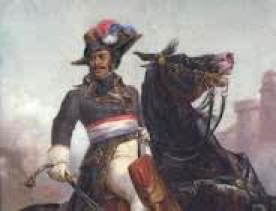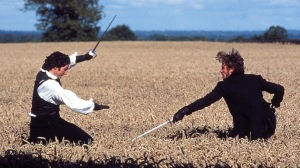A new generation of viewers are being introduced to the swashbuckling adventures of D’Artagnan and his friends and brothers in arms Athos, Porthos and Aramis. Many will know their motto,
“All for one, One for all”
as their adventures are played out in the BBC’s new Sunday night family drama series. The Three Musketeers has been produced on screen in film and TV numerous times. even in the form of a cartoon, “Dogtanian and the Three Muskehounds“ in the early 80’s.
For me it’s great that once again these works are getting exposure as I’ve felt a love for stories of adventure ever since I was a child. I remember my father had a collection of classic books, bound in faux leather with gold leaf print. This of course caught my attention and when I started reading them they captured my imagination. As I got older I wanted to learn more about who had created such wonderful tales and when I looked I was inspired by what I saw. Alexandre Dumas a man who like me was mixed race, a man who was black and went on to be one of the most widely read French authors in history.

Alexandre Dumas’ father also had a ground breaking career. Thomas- Alexandre Davy de la Palileterie was the son of a French nobleman and an enslaved woman of African descent. Thomas was born in to slavery due to his mother’s status but his father’s status allowed him to be educated and he entered the French military. Thomas went on to become the highest ranking person of colour in the continental European army, a record that still stands.
Alexandre Dumas was born in Vilers-Cotterets in France to his war hero and General father and Marie-Louise Elisabeth Labouret the daughter of an innkeeper. Thomas died of cancer when Alexandre was four years old. The family became impoverished and were unable to provide Alexandre with an education as they could not afford the school fees. Dumas threw himself into reading everything he could get his hands on. He taught himself Spanish and his mother would tell him tales of his father’s bravery during the Revolutionary wars.

Despite his impoverished background Alexandre went onto have amazing success as an author creating some much love characters, such as the Comte de Monte-Cristo and thrilling people for generations with his work. his fathers rank and reputation still carried some influence that mitigated the poverty he faced growing up, but the aristocratic background and personal success did not stop him facing discrimination and racism; a fact that Jacques Chirac acknowledged in 2002 at a ceremony where Alexandre’s ashes were reinterred in the Pantheon of Paris. Alongside fellow greats Victor Hugo and Emile Zola many people are surprised when they find out that Alexandre Dumas was black. A recent French film even decided to cast white actor Gerard Depardieu in a curly wig to play him. But some have been made aware of Alexandre’s ethnic background from an interesting source, In Quentin Tarantino’s ‘Django Unchained’ when racist plantation owner and Francophile Calvin Candie played by Leonardo DiCaprio names his Mandingo fighters after Dumas’ characters and has this fact pointed out by Christoph Waltz’s character Dr King Schultz.
We know that Alexandre faced racism and discrimination and we know this adversely affected his life. But he almost never addressed the issue directly in his works. As far as I know he only directly referenced race once in a short story called ‘Georges’. The story is about a half French “Mulatto” and looks at the effects of both race and colonialism but some say his novels work as metaphors and ‘The Count of Monte-Cristo’ is a parable of emancipation

We still have a long way to go. We are still struggling with representation in all sections of the media and life as a whole. But it is a testament to Alexandre that 170 years after it was published The Three Musketeers is still entertaining, and although this might not be the best adaptation of his works I could not help but notice among the cast the part of Porthos is being played by a mixed race actor Howard Charles. As I said, still a long way to go.
Episode 3 of The Musketeers is on BBC One at 21:00 Sunday 2nd February. Watch Episodes 1 and 2 here
Glen Chisholm is a UK based town Councilor of mixed Jamaican and English descent. He is deputy portfolio holder for communities on his local council also sitting on the Police and Crime Panel and also as Equality and Diversity advisor for a local charity. Glen has previously blogged for a mental health charity trying to raise awareness of the stigma around mental health. Twitter @glenchisholm
Media Diversified is a 100% reader-funded, non-profit organisaton. Every donation is of great help and goes directly towards sustaining the organisation







Funny, how people can write about “respect” without even respecting the identity of others.
Alexandre Dumas was a quadroon and his father mulatto. None of them suffered fromfeelings of inaedequancy or inferiority complexes. Africa was never a topic for Alexandre Dumas, most of his genetic heritage was European and he hadn’t been brain washed by the one-drop rule. It’s time for Africans an other predominantly black people to start claiming their own instead of claiming people who are half or more white.
LikeLike
Many thanks for writing this, Glen. ‘The Three Musketeers’ was one of my favourite books as a kid.
LikeLike
It is real counterproductive to label any people with some non-white ancestry as “people of color” or even worse, “black.” You are only confirming the myth of white racial purity when you do that. Alexandre Dumas, pere, was a quadroon or predominately white. What’s wrong with calling him a mixed-race white? Stop trying to divide the world into supposedly pure “whites” and everyone else.
LikeLike
Great, informative piece. More people should know of the contributions made by Africans and people of African descent during the centuries of Trans Atlantic Slavery. By moving the contemporary narrative on from a narrowly-defined focus on “slaves”, we restore their humanity and respect our own history.
LikeLike
= )
I half-watched the show for the first time last night and noted that slavery and racism were being directly addressed. Porthos’ mixed-race origins were acknowledged, and he argued passionately that ‘men are not commodities’ [*feminist throat clearing*] against the complicit white men who agreed that slavery was wrong but ‘not illegal’. Awesome!
Watch here (er and how hot is D’artagnan? I’m not even into men but… damn!)
LikeLike